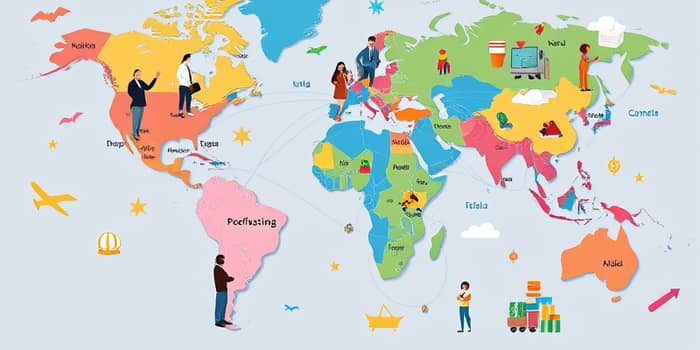Over the past 75 years, international commerce has been a powerful engine of prosperity and innovation. Trade has historically outpaced global economic growth, rising by an average of 6% annually and fostering deeper connections among cultures and markets. For emerging economies, this surge in trade has unlocked unprecedented chances to expand their industries, create jobs, and improve living standards.
Major Trends Shaping the Landscape
Global merchandise exports have soared, with developing regions integrating more deeply into supply chains. The growing share of global GDP contributed by emerging markets underscores their expanding influence. South-South trade, the exchange of goods and services among developing nations, rose from 15% of total developing-country trade in 2005 to 24% today, signaling a profound shift in commercial alignments.
Integration into world markets offers integration into global value chains and access to advanced technologies. As middle-income economies upgrade from raw commodities to higher-value manufacturing and services, they forge new paths in sectors like electronics, machinery, and digital solutions. Countries such as Vietnam, India, and Malaysia exemplify this transformation, climbing the value chain and attracting foreign direct investment.
Core Opportunities for Growth and Innovation
Emerging economies can harness several key levers to accelerate development and prosperity. By focusing on strategic priorities, nations and businesses alike can maximize their stakes in the global market.
- Export-led growth models that generate jobs and lift communities out of poverty.
- Technology transfer and industrial upgrading through partnerships with global firms.
- Market diversification that reduces dependence on a single region.
- Investment in green industries and infrastructure for sustainable expansion.
Each opportunity builds on a foundation of collaboration, innovation, and careful policy design. Targeted support from multilateral frameworks and local reforms can transform these possibilities into tangible outcomes.
Strategic Shifts and Geopolitical Realignments
The current era of trade tensions among major economies is reshaping supply chains and opening doors for emerging nations. Companies are exploring alternative bases in Vietnam, Mexico, Indonesia, and India to diversified beyond raw commodities and mitigate risks. Preferential trade agreements among developing countries now outnumber those between developing and developed nations, creating new alliances.
- Nearshoring trends that move manufacturing closer to end markets, boosting Mexico and Central America.
- Regional pacts like RCEP and AfCFTA enhancing intra-regional commerce.
- Shifts in agricultural demand benefiting Brazil and Argentina as alternative suppliers.
- Renewed focus on supply chain resilience and diversified sourcing strategies.
These adjustments underscore the importance of flexibility and forward planning. Nations that anticipate geopolitical shifts can position themselves as reliable partners in the evolving global order.
Navigating Challenges and Building Resilience
Despite the promise of international trade, emerging economies face hurdles such as infrastructure gaps, regulatory barriers, and economic volatility. Commodity-dependent countries remain vulnerable to price swings, while political instability can undermine investment. Addressing these issues requires robust governance, targeted investments, and inclusive policies that ensure benefits reach all segments of society.
- Strengthening transport, logistics, and digital infrastructure to improve competitiveness.
- Implementing transparent regulations and streamlined customs procedures.
- Promoting social inclusion and skills development to spread prosperity.
- Establishing contingency plans to cushion against external shocks.
Through coordinated efforts between governments, private sectors, and international institutions, emerging markets can transform vulnerabilities into sources of strength and resilience.
Charting the Future: Digital Transformation and Sustainability
The next frontier of trade growth lies in digital services, green technologies, and sustainable practices. With rapid mobile connectivity and e-commerce penetration, countries can leapfrog traditional development stages and tap into global online markets. Access to new international markets via digital platforms offers small and medium enterprises a direct path to consumers everywhere.
Environmental considerations are equally vital. By embracing environmentally sustainable trade practices, emerging economies can foster long-term growth that respects natural resources and combats climate change. Investments in renewable energy, sustainable agriculture, and low-carbon manufacturing will define resilient economies of tomorrow.
Conclusion: Seizing the Promise of Global Trade
The journey from local markets to international prominence is complex but achievable. Emerging economies that adopt strategic reforms, invest in infrastructure, and cultivate human capital can unleash high growth potential for investors and citizens alike. By fostering partnerships, innovating boldly, and prioritizing sustainability, these nations will write the next chapter of global prosperity.
As trade patterns evolve and new alliances form, the world stands ready to welcome fresh players to its stage. For entrepreneurs, policymakers, and communities in emerging economies, the time to act is now. Harness the momentum of globalization, build resilient systems, and embrace transformative change—your opportunity is on the horizon.
References
- https://www.tutor2u.net/economics/reference/benefits-and-risks-of-trade-for-emerging-economies
- https://voxdev.org/topic/trade/how-can-emerging-economies-break-free-sidelines-global-trade
- https://www.aiu.edu/blog/emerging-market-economies-opportunities-and-challenges/
- https://www.imf.org/external/np/exr/ib/2001/110801.htm
- https://globallycool.nl/2025/01/31/the-looming-trade-war-implications-for-emerging-markets-across-the-globe/
- https://ourworldindata.org/trade-and-globalization
- https://www.wto.org/english/thewto_e/whatis_e/inbrief_e/inbr_e.htm
- https://www.intracen.org/news-and-events/news/new-market-opportunities-in-emerging-markets










